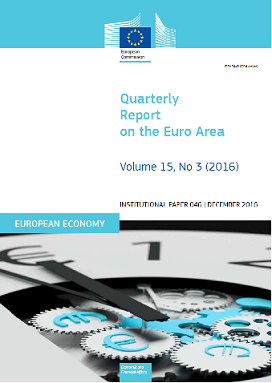Muellbauer, John, (2016), “Macroeconomics and consumption: Why central bank models failed and how to repair them”, VoxEu, 21 December The failure of the New Keynesian dynamic stochastic general equilibrium models to capture interactions of finance and the real economy has been widely recognised since the Global Crisis. This column argues that the flaws in these models stem from unrealistic micro-foundations for household behaviour and from wrongly assuming that aggregate behaviour …Read More
On the Optimal Speed of Sovereign Deleveraging with Precautionary Savings
Philippon, Thomas, Roldán, Francisco, (2016), “On the Optimal Speed of Sovereign Deleveraging with Precautionary Savings”, International Monetary Fund, November We study the optimal path of reduction of government debt in an economy when the economy is depressed and there is significant sovereign default risk. We emphasize the endogenous response of savers to sovereign risk. We obtain two main results. First, this new macro-economic channel changes the tradeoff between the recessionary …Read More
Measuring the Uncertainty in Predicting Public Revenue
Mourre, Gilles, Astarita, Caterina, Maftei, Anamaria, (2016), “Measuring the Uncertainty in Predicting Public Revenue”, European Commission, December This paper provides an assessment of the uncertainty surrounding revenue predictions, through an ex post analysis of European Commission’s forecasts over the last 15 years. It estimates the forecast errors affecting revenue for all 28 Member States, using the different vintages of the autumn and spring Commission forecasts. It analyses both the direction and …Read More
The Effects of Labor and Product Market Reforms: The Role of Macroeconomic Conditions and Policies
Romain Duval, Davide Furceri, (2016), “The Effects of Labor and Product Market Reforms: The Role of Macroeconomic Conditions and Policies”, International Monetary Fund, November The paper estimates the dynamic macroeconomic effects of labor and product market reforms on output, employment and productivity, and explores how these vary with prevailing macreconomic conditions and policies. We apply a local projection method to a new dataset of major country- and country-sector-level reform shocks in …Read More
The proposed mobility package may not have much effect on mobility, but what about politics?
Barslund, Mikkel, Busse, Matthias, (2016), “The proposed mobility package may not have much effect on mobility, but what about politics?”, CEPS, 16 December ON TUESDAY OF THIS WEEK, December 13th, the European Commission unveiled its long-awaited second part of the mobility package on the coordination of social security benefits (Regulation 883/2004).[1] While this regulation concerns only a small part of the population in the EU – with the proposed changes affecting …Read More
Quarterly Report on the Euro Area – No 3 (2016)
European Commission, (2016), “Quarterly Report on the Euro Area – No 3 (2016)”, Institutional Paper 046, December In his State of the Union address in September, Commission President Jean-Claude Juncker stressed that the European Union (EU) ‘is, at least in part, in an existential crisis’. He urged leaders to pull together to stop the EU unravelling in a challenging environment of low trust, rising populism and greater focus on domestic problems …Read More
The impact of uncertainty on activity in the euro area
European Central Bank, (2016), “The impact of uncertainty on activity in the euro area”, ECB, 19 December Fluctuations in uncertainty can play an important role in shaping the economic conjuncture and outlook. This article discusses the various methods proposed in the literature to measure uncertainty and shows how these measures have evolved in the euro area. It describes the transmission channels of fluctuations in uncertainty to the economy and provides …Read More
Public policy in a zero-growth scenario
Perotti, Enrico, (2016), “Public policy in a zero-growth scenario”, VoxEu, 16 December Per-capita income in developed countries has stagnated, which most economists regard as a departure from the long-run trend. This column argues that zero long-term growth will be the new normal. In this zero-growth world, spending increases must always be balanced against spending reductions elsewhere or in the future, which creates a further problem: no politician could implement policy changes …Read More
Macroeconomic stabilization, monetary-fiscal interactions, and Europe’s monetary union
Corsetti, Giancarlo, Dedola, Luca, Jarociński, Marek, Maćkowiak, Bartosz, Schmidt, Sebastian, (2016), “Macroeconomic stabilization, monetary-fiscal interactions, and Europe’s monetary union“, European Central Bank, December The euro area has been experiencing a prolonged period of weak economic activity and very low inflation. This paper reviews models of business cycle stabilization with an eye to formulating lessons for policy in the euro area. According to standard models, after a large recessionary shock accommodative monetary and …Read More
Skill Shortage and Surplus Occupations in Europe
CEDEFOP, (2016), “Skill Shortage and Surplus Occupations in Europe“, European Centre for the Development of Vocational Training, November 2016 European policymakers have long-standing interest in the extent, causes and consequences of skill mismatch. Problems posed by skill shortages and surpluses are of particular concern. Cedefop has developed an innovative risk-based approach that helps identify occupations that European and national policymakers should prioritise due to skill mismatch. It also provides insights into …Read More





